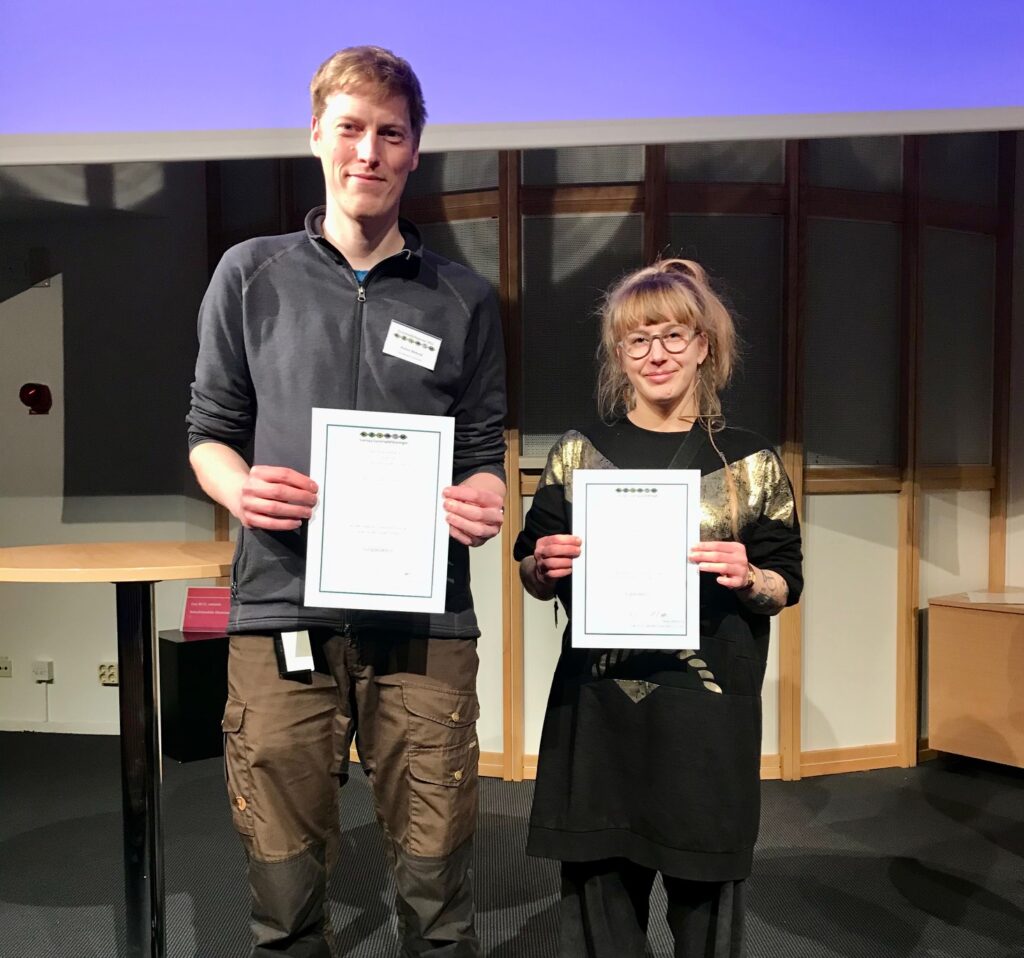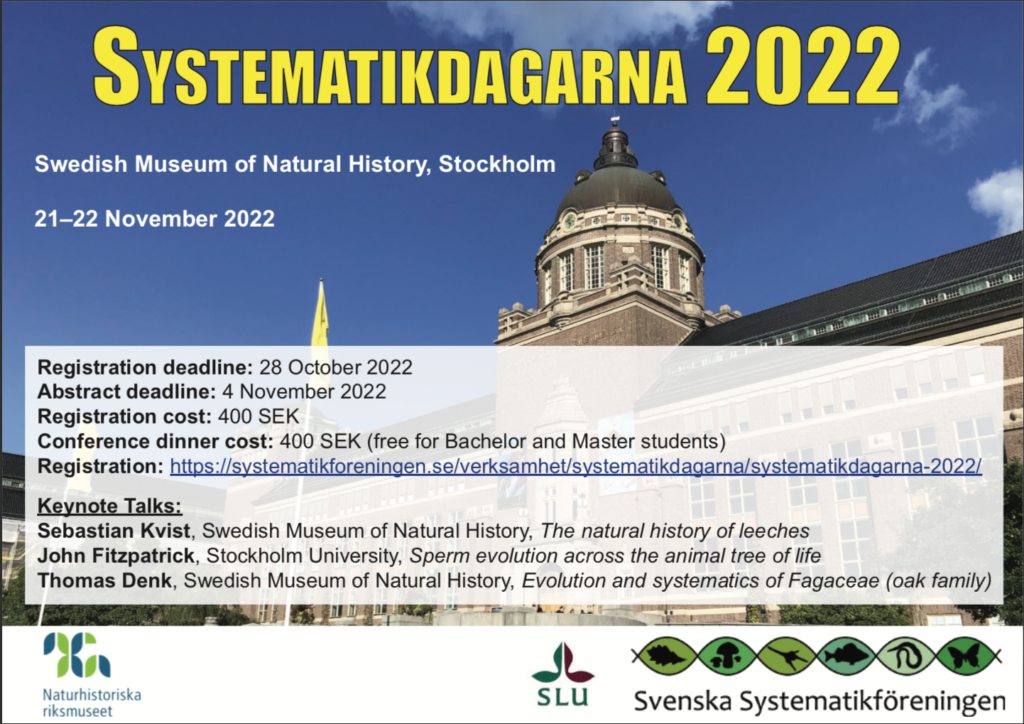The Natural History Museum of Denmark, part of the Faculty of Science at the University of Copenhagen, is looking for a Tenure-track Assistant Professor and Curator of Botany to start 1st June 2023 or as soon as possible thereafter.
About the job
The Natural History Museum of Denmark is seeking excellent candidates for a position as Tenure-track Assistant Professor and Curator of Botany. The successful candidate will be part of the Botany Section and is expected to have expertise in either vascular plants or mycology. As Assistant-Professor and Curator of Botany at the Natural History Museum of Denmark, you will be part of a dynamic team working on one of the largest museum projects in Scandinavia in the past fifty years.
The job is dedicated to collection-based research (systematics, taxonomy, biodiversity conservation or other relevant fields) and other museum duties, including scientific curation and public engagement. The curatorial work will focus on the botanical and mycological specimens in Herbarium C and in the Botanical Garden. This includes digitising the collections and making them available as an open-access resource for researchers, educators and other stakeholders; providing access to collections for national and international users; increasing the collections through active fieldwork, donations, acquisitions, etc. Other responsibilities include research-based teaching and student supervision.
The successful candidate will show strong potential to establish a productive, collections-based research program, supported by external funding, which will complement and enhance existing strengths within the Botany Section and the Museum. They will have a broad interest in museums, collections and engaging with the public and ideally have experience in scientific curation and public engagement. It is an advantage if the candidate has some university-level teaching experience from relevant courses.
Assessment of applicants will primarily consider their level of documented, internationally competitive research. The ability to attract external funding will be considered together with outreach qualifications. Teaching qualifications are not mandatory but documented teaching qualifications and teaching experience will be considered.
Six overall criteria apply for assistant professor appointments at the University of Copenhagen. The six criteria (research, teaching, societal impact, organisational contribution, external funding and leadership) are considered a framework for the overall assessment of candidates. Furthermore, each candidate must be assessed according to the specific requirements stated in the job advertisement. Please read more at https://snm.ku.dk/ledige-stillinger/Criteria_for_recognising_merit_Assistant_professors_SNM.pdf
About Us
Natural history museums have never been more important. The impact of climate change and anthropogenic forces on biodiversity has reached a critical point. We need action to build a more sustainable relationship with nature. The Natural History Museum of Denmark is the national museum for nature. We work to empower citizens to connect with nature with the aim to create positive change for life on Earth. We want to inspire, engage and enable people to enjoy, understand, and care for the diversity of the natural world.
We are currently building a new Danish national museum for nature. One big museum site, in the Botanical Garden, in the centre of Copenhagen, will host state-of-the-art laboratories, outstanding research collections, new public galleries, and combined facilities for programming, education, and citizen science. Over the next few years, the museum aims to change the way people think about and use natural history museums.
The Botanical collections contain approximately 2.9 million specimens from all over the World. The vascular plants of Herbarium C are distributed across three individual herbaria: The General herbarium, the Greenland herbarium and the Danish herbarium. Additionally, the Botanical collections comprise Bryophyte, Algal and Lichen herbaria and a Fungarium. Founded in 1600, the Botanical Garden is one of Europe’s oldest and covers 10 hectares. It houses approximately 10,000 different plant species both outdoors and in greenhouses, including a number of endangered species.
The Natural History Museum of Denmark supports the United Nations’ Sustainable Development Goals in all aspects of museum activities.
Copenhagen is a highly diverse and international Scandinavian capital with a green profile. Education is free and childcare is subsidized. Public transport is well developed, and most Copenhageners take their bikes to work. There are lots of green areas in and around Copenhagen, the water in the harbour is clean enough for swimming, and the city has multiple museums and other cultural venues. The University of Copenhagen was founded in 1479 and is the largest in Denmark. The collections at the Natural History Museum of Denmark date back more than 400 years.
Read more about The Natural History Museum of Denmark at www.snm.ku.dk/english/ and about the Botanical collection at https://samlinger.snm.ku.dk/en/dry-and-wet-collections/botany/. Any questions about the position may be directed to Natasha de Vere, Head of Section for Botany (natasha.de.vere@snm.ku.dk).
The University wishes our staff to reflect the diversity of society and thus welcomes applications from all qualified candidates regardless of personal background.
Terms of employment
The position is covered by the Memorandum on Job Structure for Academic Staff.
Terms of appointment and payment accord to the agreement between the Danish Ministry of Taxation and The Danish Confederation of Professional Associations on Academics in the State.
Negotiation for salary supplement is possible.
The successful candidate is expected to take Danish lessons if there is no prior knowledge of Danish language. The International Office at the University of Copenhagen can help.
The tenure-track programme
An assigned mentor will provide the tenure-track assistant professors with guidance related to career development, other academic topics and administrative procedures.
Performance of the tenure-track assistant professor will be followed via internal yearly evaluations and a mid-term and final international evaluation by an assessment committee. If the ‘final appraisal’ is positive you will be promoted as associate professor. Performance and progression towards the criteria below will be evaluated with due consideration of differences between research fields.
Criteria for promotion
After a 6-year tenure-track period tenure-track assistant professors are expected to meet the following criteria:
- A strong publication track record within the specific field of research, including a significant number of corresponding authorships and at least some publications in high-ranked journals based on work carried out during the tenure-track period
- Strong external network of collaboration, including joint publications
- A significant track record of successful external research funding
- Establishment of a strong and internationally competitive research group demonstrating clear independence of former supervisors/mentors, or/and major contributions to the development of an existing research group demonstrating an ability to collaborate within the research group
- Completed http://www.ind.ku.dk/english/course_overview/up/ and established a teaching portfolio via participation in teaching, including preparation and development of departmental courses
- Successful supervision/co-supervision of MSc and PhD students
How to apply
The application including all attachments must be in English and submitted electronically by clicking APPLY NOW below.
Please include
- Curriculum vitae including:
- Please describe and document international network and relations
- Please describe and document internationally based activities
- Positions held at universities/research institutions outside Denmark
- Outreach activities, i.e. popular lectures or other activities in the media
- Grants held, personal or in part. Career development grants.
- Curatorial experience (curation of collections)
- Public engagement activities, i.e. citizen science projects, exhibitions, popular lectures or other relevant activities
- Diplomas (Master and PhD degree or equivalent)
- Research plan – description of current and future research plans
- If available, description and documentation of teaching and supervision experience and qualifications- please describe and document:
- Experience with supervision of BSc and MSc students
- Teaching experience
- Formal pedagogical training
- Complete publication list
- Separate reprints of up to 5 particularly relevant papers
The deadline for applications is 14 December 2022, 23:59 GMT +1.
After the expiry of the deadline for applications, the authorized recruitment manager selects applicants for assessment on the advice of the Interview Committee.
You can read about the recruitment process at http://employment.ku.dk/faculty/recruitment-process/.
Interviews/trial lectures will be held on 27 April 2023.
Please refer to the following no. in future communication in this case: 211-0136/22-2N.




